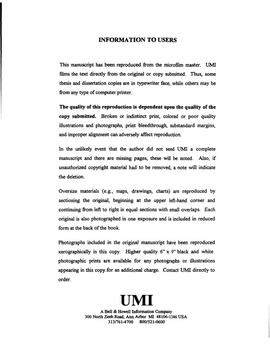Medicaid and the politics of state health care reform.
Abstract
This research draws upon the framework established by Oliver and Paul-Shaheen (1997). They argue that two general types of elements influence health care reform; contextual conditions and dynamic factors. Contextual conditions, described above, provide the opportunity for decision makers to act. Whether decision makers do so or not, depends largely on the dynamic factors of leadership and information flow. This study closely examines Oklahoma's health care reform efforts in 1992 and 1993. This dissertation points out that while there was certainly an opportunity for reform, key legislators played an important role in getting legislation passed to place medicaid beneficiaries in a managed care system. The study also examines the group politics involved in the reform process. Generally speaking, Medicaid consumers had the least access. Large interest groups, such as the nursing home association and the medical industry, were better represented than Medicaid beneficiaries. Ironically, those with the most influence, such as physicians and hospitals, fared worse than Medicaid consumers when the new managed care program was implemented in Oklahoma. This dissertation focuses on state policy innovation among Medicaid programs. Budget constraints and a Republican Congress have led states to become more resourceful in the ways which policies are implemented. Medicaid provides a good example, illustrating how many states have adopted managed care in an effort to reduce costs and broaden health care coverage. I too argue that states draw lessons from other states and that ideas pass through the medium or informal networks within state legislative bodies. I further contend that the adoption of managed care for Medicaid recipients is also influenced by other factors indigenous to a state. These factors create a context favorable to reform. To illustrate, I rely on data derived from a pooled cross-sectional time series analysis using variables such as the number of uninsured, the fiscal health of a state, and the number of years states have had HMOs.
Collections
- OU - Dissertations [9477]
Related items
Showing items related by title, author, creator and subject.
-
State claims. Letter from the Acting Secretary of the Treasury transmitting the report of the Third Auditor and Second Comptroller, making allowances to the State of Massachusetts of $26,228.44, and the State of Pennsylvania of $7,546.83, on account of "refunding to States expenses incurred in raising volunteers," and to the State of Texas $148,615.97, on account of "re-imbursement to certain States and Territories for expenses incurred in repelling invasions and suppressing Indian hostilities.".
House of Representatives Executive Document No. 413, 51st Congress, 1st Session (1890) (1890-06-12) -
Indian Trust Bonds. Letter from the Secretary of the Interior, stating the amount of bonds of the State of Virginia, and bonds of other corporations guaranteed by the State of Virginia, held by the United States in trust for certain Indian tribes, and asking for authority to dispose of the same.
House of Representatives Executive Document No. 72, 38th Congress, 2nd Session (1865) (1865-02-23) -
Letter from the Governor of the State of Missouri, transmitting an act of the General Assembly of the State of Missouri for ascertaining and settling the northern boundary line of that state; together with a memorial of the Legislature of said state on the same subject
Senate Document No. 40, 26th Congress, 2nd Session (1841) (1841-01-05)
